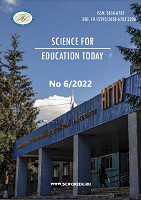Оценка биологических эффектов бурых водорослей Laminaria digitata (по результатам исследований на лабораторных животных)
Evaluation of the biological effect of the brown algae Laminaria digitata (based on studies on experimental animals)
Author(s): Aleksandr Stepanovich Ogudov, O. A. Shepeleva, Natalya Fedorovna Chuenko, N. A. Shestakov, Irina Gennadyevna Shevkun, Igorevna Novikova NovikovaSubject(s): School education, State/Government and Education, Health and medicine and law, Human Ecology, Sociology of Education
Published by: Новосибирский государственный педагогический университет
Keywords: Laminaria digitata algae; Toxicology experiment; Wistar rats; Biological effect; Lipid metabolism; Hypoglycaemic effect; Hormones; Special foods for school nutrition;
Summary/Abstract: Introduction. Currently, the problem of keeping schoolchildren healthy is acute. One of the leading risk factors for the health of schoolchildren is nutrition, in the organization of which much attention has recently been paid to the inclusion of special foods that help prevent diet-related diseases. The White Sea brown alga, Laminaria digitata, has been shown to be a natural source of bioactive compounds. However, the mechanisms of the kinetics of health-promoting effects during long-term dietary intake of Laminaria digitata are poorly studied which makes it difficult to solve practical problems in the use of products and dishes containing Laminaria digitata for health purposes. The purpose of this research is to study the biological effects of Laminaria digitata in a 28-day experiment in white Wistar rats to address practical issues of justifying food formulation and food processing for school nutrition, and to assess the risk of side effects. Materials and Methods. The study used dry concentrates of Laminaria digitata. The sample comprised white Wistar rats divided into 4 groups of 10 animals each. The animals were examined on the 14th and 28th days of the experiment using standard methods. The experiment was conducted in accordance with the rules adopted in the European Convention for the Protection of Animals Used for Experimental Scientific Purposes (Strasburg, 1986), after approval by the Ethics Committee of Novosibirsk Research Hygiene Institute. The statistical processing of the research materials was performed using Statistica 10.0. Results. The analysis of the dynamics of the indicators showed the stages of the interaction process of the organism with bioactive substances contained in the brown alga Laminaria digitata. Strengthening of stress-protective, antihypercholesterolemic effects and metabolic function of the liver at the stage of primary reactions is replaced by a significant weakening at the stage of physiological adaptation. The bioavailability of a form of iodine accumulated by the brown algae Laminaria digitata has been experimentally confirmed. The assessment of biological significance consisted of classifying the effects manifested using benefit and safety criteria. Conclusions. Based on the results of the experiment, new knowledge was gained on the criteria for the usefulness and safety of Laminaria digitata algae, which can be used to solve practical problems of proving the quantitative values of the inclusion of Laminaria digitata as an ingredient in recipes and to solve practical problems with Laminaria digitata enriched food production technologies in the development of school meals, the inclusion of which in students' diets minimizes the risk of diet-related diseases.
Journal: Science for Education Today
- Issue Year: 12/2022
- Issue No: 6
- Page Range: 189-211
- Page Count: 23
- Language: Russian

